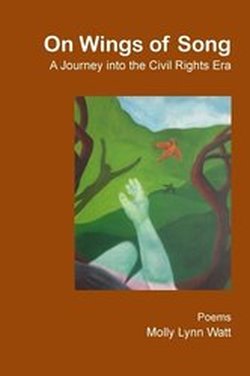|
Still struggling with Jim Crow On Wings of Song, A Journey Into the Civil Rights Era By Molly Lynn Watt, Ibbetson Street Press, 2014 Poet’s new collection explores racial prejudice, offers challenge to readers. Reviewed By Wendell Smith (Published in print: Thursday, December 11, 2014) Lynn Watt’s memoir of her part in our struggles with Jim Crow, “On Wings of Song,” is that rare book of poetry that is a page-turner. I began it about 9:30 and by the time she had been arrested, thrown (with her two babies) into jail and escaped with her family the clock was approaching midnight. Although Molly uses the first person, these poems are not about her or heroism, rather in them she bears witness to what, if it happened to her, happened to many others and, by extension, to all of us. Her poetry provides an opportunity for us to contemplate our history and ask ourselves, given current events, what we need to do to meet the challenge of her witness. Perhaps we should begin, as Molly begins On Wings of Song, with a confession: Yes My people owned slaves split husband from wife traded parent from child worked folks like mules … Yes this is the stain my forebears passed to me slaves bought at auction slaves sold for profit yes … She follows this confession with her introduction to our racist reality, when, at the age of eight, she watches as a small girl, the daughter of an African American soldier, is dragged by a bus in Washington, D.C.: The bus rumbles into motion drags the child along the gutter … Daddy runs into the street … shouts stop for God’s sake stop brakes screech the bus halts. The driver calls out black or white? … She breathes she will recover Daddy grasps the soldiers hand God be with you and your daughter I brought mine to meet Abe Lincoln but she met Jim Crow instead She continues, in poetry as lucid and compelling as those opening verses, to acquire a family, train in Vermont at the Putney School, and to set off to Tennessee with an integrated group to start a summer work camp for the legendary Highland School. They barely arrive before they are terrorized at 3 AM by a deputized mob and thrown in jail. The legal resolution and their escape back to Cambridge are worthy of Kafka. She begins the book’s final section with this assertion, Jim Crow Lurks When they say he’s uppity they say that’s very white of you … they say but you don’t even look – they say I don’t even think of you as – they say I’m colorblind then, before she concludes by quoting “We Shall Overcome,” she gives us this description with its implicit challenge, the girl in skin-tight jeans strains toward the mirror mascaras her lashes … she knows the story – her grandmother not much older than she packed up two babies… … this girl owns her civil rights but cannot imagine her vote counts she does not know she is living the dream but must keep dreaming it or the movement will stop Jim Crow still tramps the street So, my friends, how shall we meet the challenge of these poems? Molly Lynn Watt was an active member of the Peterborough community for many years. She and her husband, Dan, lived on Gregg Lake in Antrim. She taught at Antioch New England in Keene, was on the board of the Lyceum, active in the Unitarian Order On Wings of Song now!Amazon Author Page for Molly Lynn Watt
Ibbetson Street Press, 2014"Local writer releases a lyrical memoir of the Civil Rights Movement"
|
"I want to write poems
the way a jazz man composes on his feet sways in rhythm taps a syncopated beat I want to howl and growl to a bottleneck slide pulse with rage and heat rap a wild wind run to blast away injustice..."
|

